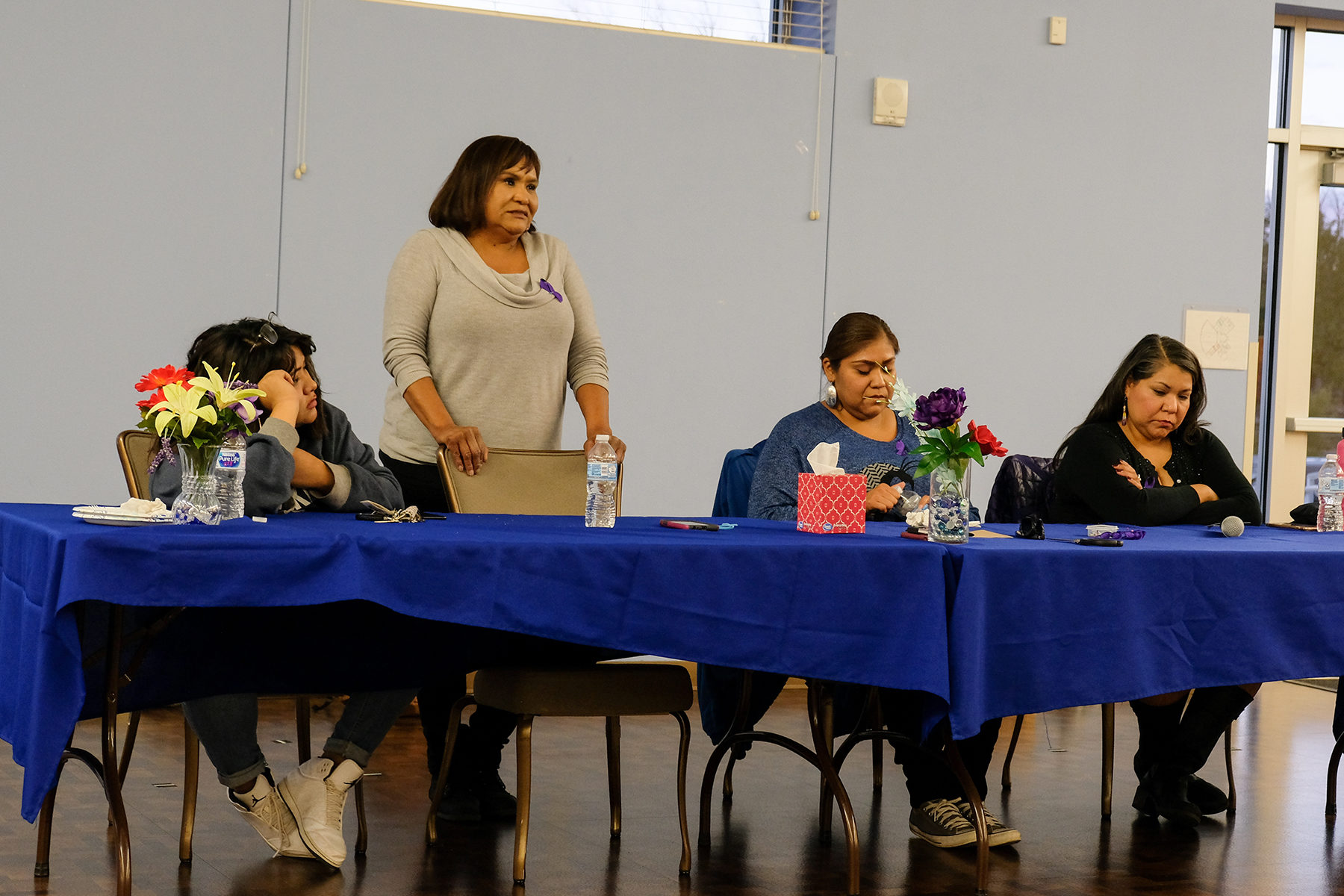Across the nation, violence against Indigenous women has reached staggering levels.
Did you know that Native American women are at a higher risk for domestic violence than any other ethnicity?
According to a study from the National Institute of Justice, some 84 percent of Native Indian and Alaska Native women have experienced violence in their lifetime, and more than half have endured this violence at the hands of an intimate partner.
On Monday, Oct. 15, a domestic violence awareness night was held at the Southern Ute Multi-Purpose Facility. A panel discussion convened to help break the silence and stop the violence. The panel was facilitated by three strong, Southern Ute women: Mikki Naranjo, Twyla Blackbird and Heather Frost.
“It’s a healing process for some of us,” Naranjo said.
Trying to find a solution and help end domestic violence, these women pioneered to help bring awareness to our small community, and start prevention.
According to the Indian Law Resource Center, more than four in five American Indian Alaska Native women have experienced violence, and one in two have experienced sexual violence. If the statistics don’t make it clear, then three women telling their own abuse stories do.
“I was crushing my soul, my spirit and everything was crushing me.” Blackbird said. “I was addicted to a toxic man.”
There is a clear and defined problem in Native communities and within Indigenous families. In 1994 the Violence Against Women Act (VAWA) was signed into law by then, President Bill Clinton. VAWA is a federal legislation that provided 1.6 billion dollars toward the investigation and prosecution of violent crimes against women.
When the federal legislation ended for VAWA in 2011 the 113th Congress quickly acted and passed a bipartisan VAWA with tribal provisions. On March 7, 2013, President Obama signed the Violence Against Women Reauthorization Act of 2013 (VAWA 2013) into law. Not only a historic step forward for Indigenous women, but for tribal communities everywhere and this was a giant step forward for the United States to help protect Native women from domestic violence, especially on reservations.
Naranjo, Blackbird and Frost are not the only Southern Ute women who have taken a stand to end domestic violence. On March 7, 2013 tribal member, Diane Millich stood up on national television and spoke her truth about being a domestic violence survivor and how the laws on the Southern Ute Indian Reservation did not protect her. The law prevented her non-tribal, ex-husband from being arrested and prosecuted because the assaults were taking place on an Indian Reservation.
“My non-Indian husband moved into my house on the reservation, to my shock just days after our marriage he assaulted me. After a year of abuse and more than 100 incidences of being slapped, kicked, punched and living in horrific terror, I left for good,” Millich said.
In 2013 and under the VAWA 2013 three tribes were authorized to run this new law as a pilot project and they will be authorized, for the first time, to prosecute non-Indian men for certain crimes of domestic violence against Native women.
Pascua Yaqui of Ariz., Taulalip of Wash., and Umatilla of Ore., the first tribes, under the pilot program, to exercise criminal jurisdiction over domestic violence when a non-Indian is involved and as of 2015 each tribe is able to approve this type of jurisdictional law into their own tribal codes.
“Now our protection orders are not just honored on the reservation but in all the other states, as long as they have a certified copy on their person,” said Joann Gomez, Southern Ute Victim Services crisis case worker. “We serve everybody in the community who live within the exterior boundaries of the reservation, it doesn’t matter if they’re Native American or not.”
Basically, the Tribe’s inherent power to exercise special domestic violence criminal jurisdiction over certain defendants regardless if their Indian or non-Indian status who commit acts of domestic violence and, or violate certain protection orders in Indian Country.
Stories were shared, women were empowered and supporters left with tear stained faces.
“There’s always people that love you and that are going to help you,” Frost said. “You do have the support out there.”
If you or someone you know are in an abusive relationship don’t be afraid to reach out for help. The Southern Ute Victim Services department will not report to law enforcement until you are ready. To get help contact: Southern Ute Victim Services 970-563-0245, Alternative Horizons 24-Hour Hotline at 970-247-9619, Sexual Assault Services Organization’s (SASO) 24-hour hotline at 970-247-5400 or the National Indigenous Women’s Resource Center hotline at 1-800-799-SAFE (7233).

